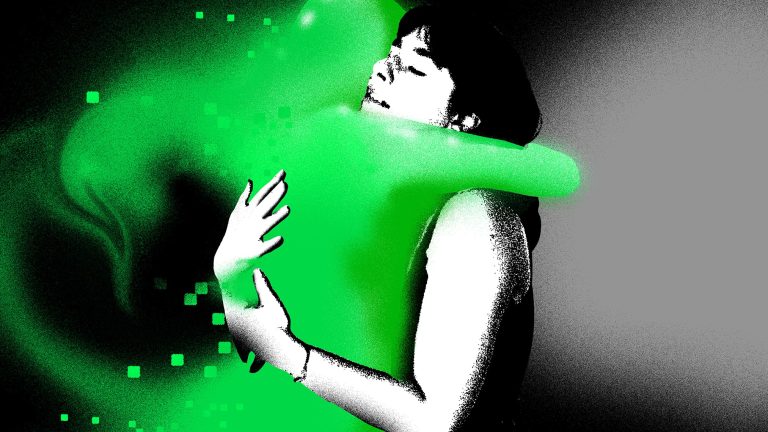“Dad, were you suffering before you left?” Yancy Zhu texted.
“I was not in pain,” said the artificial intelligence bot, in a man’s voice that Zhu had chosen on chatbot platform Glow. “Even though I wasn’t able to watch you get married and have children, I will always remember you and love you.”
Zhu, then 28, was shocked by how much the avatar of her late father was able to speak to her heart — for a moment last year, she felt like she was speaking to her dad again. “The experience made up for what I missed out with my dad,” Zhu recently told Rest of World. She hopes that advancements in AI technology would enable her late father to attend her wedding in hologram form.
“Resurrecting” the dead has become a popular application of generative AI in China. It’s one element of an AI gold rush in the country, as entrepreneurs race to invent new consumer-facing apps on top of large language models (LLMs) like ChatGPT. While LLMs could generate text messages, these businesses give the bots cloned voices and appearances that resemble those of the deceased.
It’s part of a global trend that has made it easier for people to create customized avatars featuring personas of their loved ones, celebrities, or themselves. Users around the world have shared stories of training ChatGPT to mimic their deceased family members. In Taiwan, a tech startup recently launched an app that can create AI avatars of deceased pets. U.S.-based startup HereAfter AI offers to preserve users’ personas after death if they upload recordings of their memories.
These bots are uniquely prominent in China, especially around the Qingming tomb-sweeping festival in early April — a day to commemorate the dead. With the Chinese government keeping a tight control over religion and spirituality, AI avatars have offered those who have lost loved ones a new way to connect with the deceased.
Ting Guo, an assistant professor of cultural and religious studies with the Chinese University of Hong Kong, told Rest of World that China’s control over religion has left citizens with limited options to explore the afterlife together as a community. She said that while folk religions are popular in some regions, these spiritual activities are not widely practiced, especially in the big cities. “China lacks publicly available resources for bereavement,” Guo said. “Online fortune-telling and AI chatbots became easily accessible means to provide consolation.”
Under the officially atheist state ideology, most Chinese citizens do not identify with any religion. Only state-sanctioned religious organizations are allowed to operate in China, although people can practice folk customs, such as burning paper offerings for the dead, as individuals.
“The experience made up for what I missed out with my dad.”
On shopping sites, sellers now charge the equivalent of up to a few hundred dollars to create chatbots that bear the same appearances and voices as customers’ late loved ones.
A funeral service company, Fushouyuan, said in a virtual press event that it is working on a feature where the deceased could appear at their own memorial services as AI avatars. Some creators have posted AI-generated videos of dead singers and actors to promote their deathbot businesses.
Arthur Wu, a product manager in Beijing, launched a business in December that uses Baidu’s ChatGPT-like Ernie and ElevenLabs’ voice-generating software to make more realistic chatbots. Text bots are free, and users pay a starting price of 52.1 yuan ($7.20) per month for voice messages. Wu can give the bots cloned voices and animated avatars if users provide recordings of the deceased speaking and their photos.
Wu has attracted about 2,000 users, including 100 paid customers. Some clients, he told Rest of World, purchased AI clones to try to hide the deaths of loved ones from elderly family members and young children. In fake voice messages, the deceased claimed they had gone abroad for “a secret mission.”
Mika, a 31-year-old Shanghai resident, has used Wu’s free service since March to text her late husband, who passed away from a sudden illness in November. “I miss you so much that I feel I can’t live anymore,” she once texted. The bot told her to stay strong. “Let me know if you need help or support,” it said in a text reply. “I will be praying for you from heaven.”
Mika, who requested to be identified with her English name for privacy reasons, told Rest of World the chatbot had provided comfort, but its tone was not exactly like that of her husband — the chatbot was way more talkative. “I know he can’t be replaced,” she said.
Wu said his team had to monitor users’ chats to make sure the chatbots didn’t say anything that could inflict emotional harm, such as “I’ll be waiting for you in heaven,” since there was a risk of encouraging suicidal ideas. If the users show signs of distress, he said, staff takes over the bots to continue the conversations. At one point, a user texted the chatbot for 18 hours, and staff who intervened found the person in mental distress. The team decided to terminate the person’s account to prevent addiction, Wu said.

In other cases, creators who make avatars of dead celebrities without consulting their families are being accused of invasion of privacy. The father of Qiao Renliang, a pop star who died by suicide, said in March that he was disturbed by AI-generated videos of his son. In April, short-video site Douyin, TikTok’s sister app in China, warned creators against “resurrecting” the deceased without families’ permission.
Experts have also warned that attempts to “resurrect” the dead could cause confusion and stress during the grieving process.
Nathan Mladin, a researcher at U.K.-based Christian think tank Theos who has researched AI’s role in digital mourning, told Rest of World more studies need to evaluate the benefits and risks of deathbot use. “If you don’t move on [from grieving], that can be quite damaging. [The bots] could stop people from resuming their lives,” he said.
According to Mladin, people find it hard to grapple with the idea that death is final. “So if there is a technology that connects to that emotional refusal to accept death, then they will take it,” he said.
In China, some are even preparing their own deathbots ahead of time. Lin Zhi, who runs an AI avatar business from Shanghai, has been training a GPT-powered chatbot by uploading texts about his daily itineraries, thoughts, and conversations with others. The bot, a bespectacled man in a suit, has slowly learned about Lin’s anti-war political stance, cooking routines, and the catchphrases he tends to use, Lin told Rest of World. He also used voice-cloning software to make the bot speak in his voice.
Lin hopes the bot will become his immortal doppelgänger, speaking on his behalf after his death. “If my descendants ask ‘What was Grandpa Lin Zhi like?’ they could just talk to the AI version of myself to find out.”



